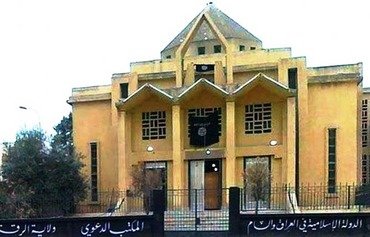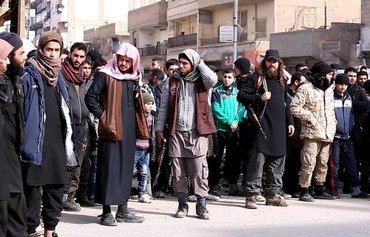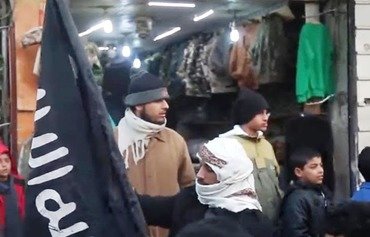As liberating forces continue their push towards the Syrian city of al-Raqa, local residents say the "Islamic State of Iraq and the Levant" (ISIL) has been ratcheting up its attempts to control their lives, minds and movements.
The Syrian Democratic Forces (SDF) have been battling the group around 25 kilometres north of the city as part of Operation Wrath of the Euphrates which kicked off November 6th.
Trapped in the city both physically and financially, in view of their inability to pursue their livelihoods or flee, residents told Diyaruna they are living under difficult conditions and are waiting to be rescued so they can resume their lives.
Meanwhile, ISIL elements are taking advantage of their situation to assert their rule, impose their extremist ideology and extort money through various means.
Media blackout
"The group has been carrying out more [home] search campaigns since the start of the Wrath of the Euphrates campaign, and any home could be searched at any time," said al-Raqa teacher Nasser al-Ali, using a pseudonym out of concern for his safety.
In the past, ISIL elements would ask for the homeowner before entering a private residence, he told Diyaruna, but now they enter as soon as the door is opened.
"They proceed to search the house thoroughly for any means of communication, and for satellite receivers in particular," he said.
This started after rumours circulated in the city that many were secretly installing satellite receivers to learn what was going on in the outside world, he said.
They also search for phones with SIM cards that enable internet connection, he said, confiscating them and jailing their owners for periods of up to two weeks.
"Internet cafés are now totally under the group’s control, and most times civilians are prohibited from entering them, as entry is restricted to ISIL elements," he said.
When they are opened to civilians, users are closely monitored and the computer monitors are turned to face the office of the café owner, who often has al-hesba ("religious police") elements sitting with him, al-Ali said.
Meanwhile, the group is insistent that local children attend its schools and absorb its extremist ideology and its lessons in warfare and weaponry, he added.
Tactics to pressure civilians to stay
It has become impossible to flee al-Raqa, city resident Amjad al-Mohammed told Diyaruna, using a pseudonym out of fear for his safety.
"In the past, travel from and to all rural al-Raqa villages and farms was allowed because the entire area was under the group’s control," he said. "But now even going to the rural areas is prohibited, and whoever does go is liable to be prohibited from returning to his home."
The ISIL bureau that manages the group's real estate confiscates any home left unoccupied by its owner, al-Mohammed said, which has "forced hundreds of families to stay in the city".
Residents know this is a new tactic to pressure them to stay in the city "as human shields" to protect ISIL elements from any future operations that are sure to target ISIL's positions and the homes of its fighters inside al-Raqa, he said.
Permission to leave al-Raqa is only granted in special cases, he added, and is typically only authorised for those who are close to the group, particularly some merchants and currency traders.
Meanwhile, ordinary residents who are granted permission must leave all their possessions as collateral until their return, he said, the date of which must be specified before their departure.
ISIL fighters amass in al-Raqa
ISIL steps up its harassment of civilians whenever the fighting intensifies in rural al-Raqa , said local merchant Wael Mustafa, using a pseudonym out of concern for his safety.
"Residents are now being held accountable for the most trivial reasons and fined instead of being subjected to [its] traditional forms of punishment like imprisonment or flogging before everyone in public squares," he told Diyaruna.
Fines are imposed when people are late for prayer, open a shop during prayer times, sell prohibited products, or when a woman leaves her home without a mahram (male guardian), he added.
"These fines often are demanded to be paid in US dollars, which is a burden to residents given the circumstances they live under," Mustafa said.
Residents who work in agriculture have incurred huge losses, he said, as they have paid rent for their farmland to ISIL, but are now unable to access the land on account of the prevailing security situation, he said.
Additionally, Mustafa said, "a curfew is being semi-enforced, despite the fact that it was never declared. After 9 p.m., the city’s streets become a ghost town with only the group’s elements on night patrol present in the streets".
The number of ISIL elements inside the city has vastly increased, he noted.
"It is said that most Jarablus city fighters are now in al-Raqa, and that many other groups have arrived from Iraq recently," he added.

![An "Islamic State of Iraq and the Levant" checkpoint stands in an al-Raqa street. [Photo courtesy of al-Raqa Is Being Slaughtered Silently]](/cnmi_di/images/2016/12/08/6733-Syria-Raqa-ISIL-600_384.jpg)






